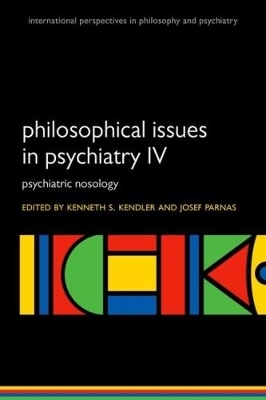
Philosophical Issues in Psychiatry IV
Oxford University Press (Verlag)
978-0-19-879602-2 (ISBN)
The revisions of both DSM-IV and ICD-10 have again focused the interest of the field of psychiatry and clinical psychology on the issue of nosology. This interest has been further heightened by a series of controversies associated with the development of DSM-5 including the fate of proposed revisions of the personality disorders, bereavement, and the autism spectrum. Major debate arose within the DSM process about the criteria for changing criteria, leading to the creation of first the Scientific Review Committee and then a series of other oversight committees which weighed in on the final debates on the most controversial proposed additions to DSM-5, providing important influences on the final decisions. Contained within these debates were a range of conceptual and philosophical issues. Some of these - such as the definition of mental disorder or the problems of psychiatric "epidemics" - have been with the field for a long time. Others - the concept of epistemic iteration as a framework for the introduction of nosologic change - are quite new.
This book reviews issues within psychiatric nosology from clinical, historical and particularly philosophical perspectives. The book brings together a range of distinguished authors - including major psychiatric researchers, clinicians, historians and especially nosologists - including several leaders of the DSM-5 effort and the DSM Steering Committee. It also includes contributions from psychologists with a special interest in psychiatric nosology and philosophers with a wide range of orientations. The book is organized into four major sections:
The first explores the nature of psychiatric illness and the way in which it is defined, including clinical and psychometric perspectives.
The second section examines problems in the reification of psychiatric diagnostic criteria, the problem of psychiatric epidemics, and the nature and definition of individual symptoms.
The third section explores the concept of epistemic iteration as a possible governing conceptual framework for the revision efforts for official psychiatric nosologies such as DSM and ICD and the problems of validation of psychiatric diagnoses.
The book ends by exploring how we might move from the descriptive to the etiologic in psychiatric diagnoses, the nature of progress in psychiatric research, and the possible benefits of moving to a living document (or continuous improvement) model for psychiatric nosologic systems.
The result is a book that captures the dynamic cross-disciplinary interactions that characterize the best work in the philosophy of psychiatry.
Dr. Kendler has pursued for most of his career substantive research in psychiatric genetics and epidemiology. He has, during that time, actively published at the interface between psychiatric genetics and psychiatric nosology. He was on the Task Forces of DSM-III-R and DSM-IV. For DSM-5, he chaired the Scientific Review Committee. He is currently vice-chair of the American Psychiatric Association's DSM Steering Committee which is overseeing changes in DSM-5. He has, over the last 15 years, written extensively on topics at the interface between psychiatry and philosophy including a number of papers on nosology. Along with Dr. Parnas, he edited volumes that included the papers and commentaries for the three prior Philosophy of Psychiatry conferences: i) Philosophical Issues in Psychiatry: Explanation, Phenomenology and Nosology, ii) Philosophical Issues in Psychiatry: II Nosology, and iii) Philosophical Issues in Psychiatry: III: the nature and sources of historical change. Dr. Parnas has published in the domain of psychopathology, epidemiology and pathogenesis of schizophrenia spectrum disorders. Over the past 25 years he has been active at the interface of psychopathology and philosophy, especially philosophy of mind and phenomenology, applying these to the issues of psychiatric diagnosis and classification. His most recent work deals with experiential trait-phenotypes of the schizophrenia spectrum disorders, in particular the anomalies of self-experience. He is a co-founder of and a senior researcher at an interdisciplinary theoretical institute, Center for Subjectivity Research at the University of Copenhagen, integrating psychiatry, philosophy, and hermeneutics in interaction with cognitive science and neuroscience. Along with Dr. Kendler, he edited three prior volumes on philosophy and psychiatry (vide supra).
PART I: NATURE OF PSYCHIATRIC ILLNESS; PART II: REIFICATION, EPIDEMICS, AND INDIVIDUAL SYMPTOMS; PART III: EPISTEMIC ITERATION; PART IV: DESCRIPTIVE TO ETIOLOGIC AND LIVING DOCUMENT
| Erscheinungsdatum | 01.04.2017 |
|---|---|
| Reihe/Serie | International Perspectives in Philosophy and Psychiatry |
| Verlagsort | Oxford |
| Sprache | englisch |
| Maße | 181 x 233 mm |
| Gewicht | 662 g |
| Themenwelt | Geisteswissenschaften ► Philosophie |
| Geisteswissenschaften ► Psychologie ► Persönlichkeitsstörungen | |
| Medizin / Pharmazie ► Gesundheitswesen | |
| Medizin / Pharmazie ► Medizinische Fachgebiete ► Psychiatrie / Psychotherapie | |
| Studium ► Querschnittsbereiche ► Geschichte / Ethik der Medizin | |
| Naturwissenschaften | |
| ISBN-10 | 0-19-879602-1 / 0198796021 |
| ISBN-13 | 978-0-19-879602-2 / 9780198796022 |
| Zustand | Neuware |
| Informationen gemäß Produktsicherheitsverordnung (GPSR) | |
| Haben Sie eine Frage zum Produkt? |
aus dem Bereich


